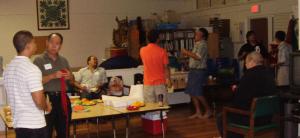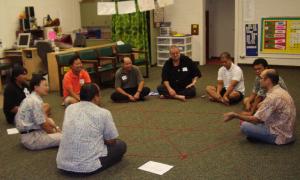It had only been a day since our 2006 Hawaii Association for the Education of Young Children (HAEYC) Men in Education Network (M.E.N.) retreat in collaboration with MenTeach.org, when I realized my memory was failing. Not for what I could not recall, but for the remarkable wealth of images, feelings, stories, and ideas coursing through my mind. Clearly, sorting through my retreat experiences was going to take some time.
Our first HAEYC M.E.N. Retreat in 2004 was held in a rather luxurious retreat facility, and though attendees appreciated the nice accommodations, several remarked that they were afraid to move around much for fear of breaking something valuable. In contrast, this year’s retreat took place in a preschool.
Punanaleo o Waianae is a Hawaiian “language nest” preschool located along the west coast of the island of Oahu. Children in Punanaleo early childhood programs are immersed in the Hawaiian language and culture, and for much of the day so were we. We were also immersed in food. For starters, the Punanaleo o Waianae parents put out a phenomenal continental breakfast and refreshments spread. Several of our retreat planning committee members, for example Ata Edralin, donated or secured donations of pastries, drinks or snacks for the day. Our ono (very delicious) Hawaiian cuisine lunch included kalua pig and cabbage, lomi-lomi salmon, lau-lau, and rice.
 Kumu (teacher) Iokepa Badis shared how he and fellow Punanaleo o Waianae kumu, staff, families, and the preschool “ohana” (Hawaiian for family and inclusive of the entire community that raises the children) work to connect the language-rich curriculum, culturally appropriate materials, and Hawaiian values in support of the clear and focused vision: E Ola Ka ‘Ōlelo Hawaii. “The Hawaiian language shall live.” Master Kumu Nailima Gaison, who joined us from the Island of Hawaii, instructed us in culturally appropriate protocol and shared how the Hawaiian language nest programs assist native Hawaiians and other indigenous people world wide who share their quest to maintain and develop traditional languages and cultures for life today.
Kumu (teacher) Iokepa Badis shared how he and fellow Punanaleo o Waianae kumu, staff, families, and the preschool “ohana” (Hawaiian for family and inclusive of the entire community that raises the children) work to connect the language-rich curriculum, culturally appropriate materials, and Hawaiian values in support of the clear and focused vision: E Ola Ka ‘Ōlelo Hawaii. “The Hawaiian language shall live.” Master Kumu Nailima Gaison, who joined us from the Island of Hawaii, instructed us in culturally appropriate protocol and shared how the Hawaiian language nest programs assist native Hawaiians and other indigenous people world wide who share their quest to maintain and develop traditional languages and cultures for life today.
There were presentations, panel discussions, games, and plenty “talk stories” on a whole range of topics. Malcolm Hee shared the findings of his Doctoral research study on the benefits, barriers, and support needs of male teachers in early childhood education (ECE). Roberto Reggio presented his method for using rhythm to help children discover their “reading voice.” A notable voice on our “Beyond Daddy Day Care” panel was Michael Robinson, himself a family home care professional. A stroll around the room during any break might reveal rich dialog between learned professionals on educational philosophies, preferred curriculums, or just two guys knocking around their favorite sports.
 Attendees knew to check their credentials at the door, but qualifications varied from non-credentialed teachers through PhD’s and from relative new-comers to 25 years plus ECE veterans. All attendees work with young children in some capacity, but their job descriptions range from infant and toddler with special needs care coordinators, preschool teachers, preschool directors, early childhood special educators, family home care professional, language nest kumu, and an early school-age reading instructor.
Attendees knew to check their credentials at the door, but qualifications varied from non-credentialed teachers through PhD’s and from relative new-comers to 25 years plus ECE veterans. All attendees work with young children in some capacity, but their job descriptions range from infant and toddler with special needs care coordinators, preschool teachers, preschool directors, early childhood special educators, family home care professional, language nest kumu, and an early school-age reading instructor.
A palpable bond emerged quickly between these guys, many of whom had never before laid eyes on one another. There was a lot of good natured ribbing, genuine caring, as well as tears. Few other gatherings would have allowed these otherwise stalwart men to risk such vulnerability. One young man who had felt obligated to attend the retreat, decided to stay past his planned mid-day departure because he was so moved by the learning and camaraderie he encountered.
Twelve men spent their Saturday spending their day with other men, and each and every one of their contributions made our 2006 HAEYC M.E.N. retreat a resounding success. After a good deal of personal reflection, what stands out the most in my mind was the abundant and robust shared male laughter: A sound rarely heard in most early childhood professional settings.
